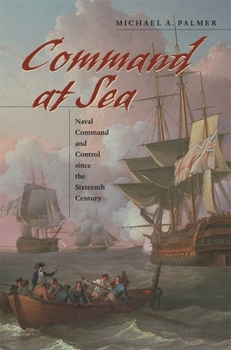Command at Sea: Naval Command and Control Since the Sixteenth Century
Select Format
Select Condition 
Book Overview
Commanders at sea struggle not only with the unpredictability of natural elements, but also with a shroud of uncertainty often referred to as the "fog of war." Over the centuries most admirals yielded to the natural temptation to find in new technologies a means to assert centralized control over their forces. But other commanders have recognized the fog for what it is: a constant level of uncertainty resistant to mere technological solution.
In this grand history of naval warfare, Michael Palmer observes five centuries of dramatic encounters under sail and steam. From reliance on signal flags in the seventeenth century to satellite communications in the twenty-first, admirals looked to the next advance in technology as the one that would allow them to control their forces. But while abilities to communicate improved, Palmer shows how other technologies simultaneously shrank admirals' windows of decision. The result was simple, if not obvious: naval commanders have never had sufficient means or time to direct subordinates in battle. Successful commanders as distant as Horatio Nelson (1758-1805) and Arleigh Burke (1901-1996) accepted this reality. They sought solutions to the dilemmas of command in the personal indoctrination of subordinates through discussion, comradeship, and displays of trust and confidence. Such leaders created a commonality of vision and fostered a high degree of individual initiative. Their decentralized approach to command resulted in a resiliency that so often provided the key to success in battle. Palmer's exciting and enlightening history reveals the myriad efforts of naval commanders to navigate the fog of war.Format:Paperback
Language:English
ISBN:0674024117
ISBN13:9780674024113
Release Date:April 2007
Publisher:Harvard University Press
Length:400 Pages
Weight:0.75 lbs.
Dimensions:1.1" x 5.8" x 8.9"
Customer Reviews
1 rating
An excellent account of naval tactics
Published by Thriftbooks.com User , 20 years ago
Palmer has writtem an supberb account of the development of naval tactics. According to Palmer there was an debate about whether intiative should be left to individual captains or the commanding admiral. Palmer believes that the British used decentralized tactics effectively against the French who were tied to centralized command during the eighteenth and early nineteenth centuries. Pamler writes that the use of decentralized tactics depended on an educated officer corps since when the French admiral Suffren tried British tactics he failed miserably due to an lack of individual intiative among the French officers. During the First World War, the British adopted centralized tactics and this hampered their performance during the Battle of Jutland. However in the Second World War, the British used decentralized tactics successfully against the Italians. Both the Americans and the Japanese used decentralized tactics during the Pacific War, but the Germans used a centralized approach that left them vulnerable to allied radio interception. The only weakness of this book is that Palmer leaves out the curriculum of naval officer cadet schools and how this influenced the tactical approach of opposing fleets. Nevertheless this book is an excellent account of different types of naval leadership.





